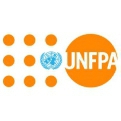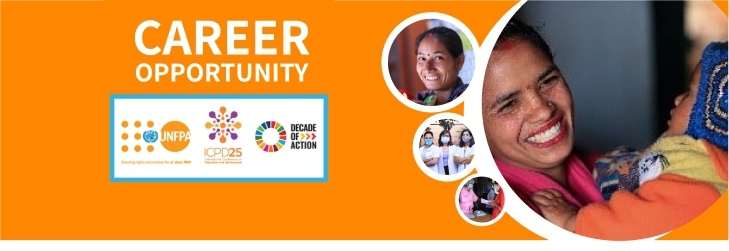


UNFPA, the United Nations Population Fund, is a voluntary-funded international organization with a presence in over 150 countries, including Nepal. UNFPA is guided by the Programme of Action of the 1994 Cairo International Conference on Population and Development (ICPD) and the Sustainable Development Goals. Its mission is to ensure that every pregnancy is wanted, every childbirth is safe and every young person’s potential is fulfilled.
The work of UNFPA is based on the premise that all human beings are entitled to equal rights and protections. We focus on women and young people because these are groups whose ability to exercise their right to sexual and reproductive health is often compromised. Our work is informed by an understanding of population dynamics, human rights and cultural sensitivity.
UNFPA in Nepal
UNFPA support to Nepal began in 1971 and has evolved in response to the changing national contexts. The new country programme is aligned to national priorities, the 2030 Agenda for Sustainable Development, the ICPD Programme of Action, the Convention on the Elimination of All Forms of Discrimination against Women, the UNFPA strategic plan, 2022–2025, and the UNSDCF, 2023–2027. The programme aims to contribute to and accelerate achievement of the 2030 Agenda, in particular SDGs 3 and 5 and the three UNFPA transformative results, in line with the Decade of Action.
UNFPA partners with the Government of Nepal, youth and women’s organizations and development partners to advance its mission. Under the 9th Country Programme and in line with its mandate, UNFPA Nepal is working around the following areas:
Sexual and reproductive health and rights: UNFPA is supporting national efforts in Nepal to improve the sexual and reproductive health of the most marginalized adolescent girls and women. The Fund is largely focusing on youth aged 15-24 and the most marginalized women addressing both the demand and supply sides of reproductive health services to improve access to information and services on maternal health, family planning, and sexually transmitted infections, including HIV.
Gender equality, Gender-based violence and Harmful Practices : UNFPA’s support to the Government of Nepal under this overarching theme seeks to ensure that vulnerable groups experience greater self-confidence, respect and dignity. We are building national capacity in the health sector to address gender-based violence (GBV), prevent child marriage and other harmful practices, and working to enhance the knowledge and capacity of men, women and communities to GBV. Investing in young people, especially the vulnerable and the marginalized, is a priority for UNFPA Nepal. The country has a large adolescent and youth population. Nepal is experiencing a demographic window of opportunity, a ‘youth bulge’. Nepali youth face several development challenges, including access to education, employment, gender inequality, child marriage, youth-friendly health services and adolescent pregnancy. Yet, with investments in their participation and leadership, young people can transform the social and economic fortunes of the country. UNFPA Nepal works with the government and partners to advocate for adolescents and youth’s rights and investments, including education, livelihood skills and health, including sexual and reproductive health.
Disaster risk reduction and climate change: UNFPA is working on environmental sustainability, climate and disaster resilience, with a focus on ensuring that the specific needs and rights of women and girls, particularly those from vulnerable and marginalized groups, are addressed in humanitarian preparedness, adaptation, response, and recovery efforts.
Population dynamics: Population megatrends at the national and sub-national levels in Nepal continued rapid population growth, population aging, urbanization and migration — not only frame the entire development debate, they demand a reconsideration and re-conceptualization of what will be the main challenges for a new Nepal. Without an adequate understanding of how Nepal is changing from a demographic perspective, forward-looking planning and agenda setting will be of little value. Keeping this in mind, UNFPA Nepal is working with the government to ensure that national, sectoral and decentralized policies and plans address population dynamics and the interlinkages with gender equality, poverty reduction, the needs of young people, and reproductive health, including family planning.
UNFPA, the United Nations Population Fund, is a voluntary-funded international organization with a presence in over 150 countries, including Nepal. UNFPA is guided by the Programme of Action of the 1994 Cairo International Conference on Population and Development (ICPD) and the Sustainable Development Goals. Its mission is to ensure that every pregnancy is wanted, every childbirth is safe and every young person’s potential …
Views: 5561 | This job is expired 3 years ago
NATIONAL POST: Programme Analyst, Family Planning
Location: Janakpur and Dhangadhi (2 Positions)
Background Information
PLEASE NOTE THAT THIS VACANCY IS ONLY FOR NATIONALS OF NEPAL
Open Date: 3 June 2022 (Friday)
Closing Date: 23 June 2022 (Thursday) Nepal Time
Duration: One year (renewable) [i]
Duty Station: Janakpur and Dhangadhi
[i]No expectancy of renewal in accordance with UN Staff regulations 4.5
Job Purpose:
The purpose of the position is to advance the FP programme as a key strategy for improving sexual and reproductive health outcomes and safeguarding reproductive rights. S/he will manage the effective and timely implementation of the UNFPA supported family planning interventions at the provincial and local level in collaboration with the UNFPA team in Kathmandu. Currently, UNFPA is implementing FP and Reproductive Health Commodity Security (RHCS) interventions at national and sub-national level through the UNFPA Supplies Partnership Thematic Trust Fund, UNFPA’s global flagship programme on family planning. These interventions are implemented in close coordination with the Government of Nepal/Ministry of Health and Population and its respective divisions.
Main Tasks & Responsibilities
You would be responsible for:
1. Provide policy advice and technical assistance for the effective delivery and sustainability of the FP projects at the provincial and local level:
2. Promote harmonization of FP and RHCS interventions through effective coordination and communication at the provincial and local level:
3. Supervision and monitoring of the FP and RHCS programme:
Qualifications and Experience
Education and Experience:
Knowledge and Skills:
Languages:
This job has expired.









